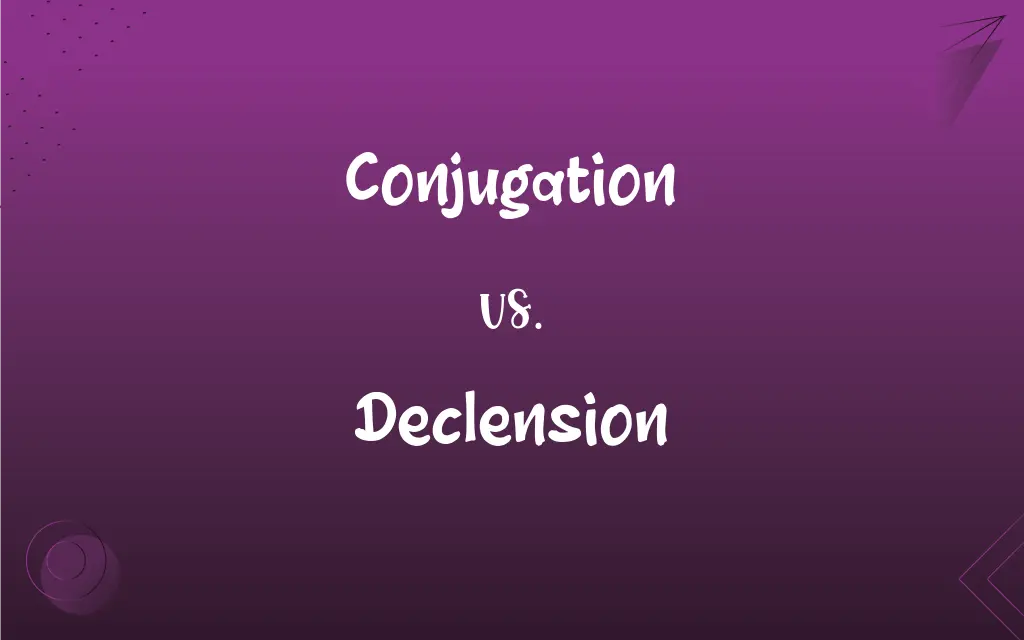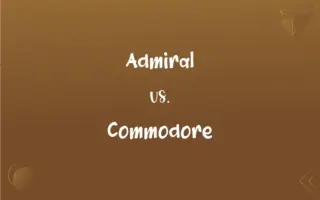Conjugation vs. Declension: What's the Difference?
By Harlon Moss & Aimie Carlson || Updated on May 22, 2024
Conjugation refers to the variation of verbs to express tense, mood, voice, etc., while declension pertains to the inflection of nouns, pronouns, and adjectives to indicate case, number, and gender.

Key Differences
Conjugation involves the systematic variation of verbs to indicate different grammatical categories like tense, mood, aspect, and voice. Declension, on the other hand, deals with the modification of nouns, pronouns, and adjectives to reflect grammatical case, number, and gender.
Conjugation is essential in forming the structure of sentences by connecting subjects with their actions or states. Declension plays a crucial role in languages with rich inflection systems, helping to clarify the roles of nouns within sentences.
While conjugation mainly affects verbs, making it easier to express actions and states, declension affects nouns and adjectives, aiding in specifying relationships and attributes. This distinction highlights the different grammatical responsibilities of each process.
Conjugation often involves patterns or paradigms specific to languages or verb groups. For example, in Spanish, regular verbs follow consistent patterns like "hablar" (to speak) becomes "hablo," "hablas," etc. Declension also follows patterns, as seen in German, where "der Mann" (the man) changes to "des Mannes" in the genitive case.
Comparison Chart
Part of Speech
Verbs
Nouns, Pronouns, Adjectives
ADVERTISEMENT
Grammatical Categories
Tense, Mood, Voice, Aspect
Case, Number, Gender
Example (English)
"am," "is," "are" for the verb "to be"
"child" (singular) vs. "children" (plural)
Language Examples
Spanish: "hablar" -> "hablo," "hablas"
Latin: "puella" -> "puellae"
Purpose
Expresses action/state
Indicates relationships/roles in sentences
Conjugation and Declension Definitions
Conjugation
The systematic pattern of verb inflections in a language.
They were playing outside.
ADVERTISEMENT
Declension
The variation of nouns, pronouns, and adjectives to indicate grammatical case.
The girl's book is new.
Conjugation
The process of verb agreement with the subject.
He walks to school.
Declension
The inflection of words to show number (singular/plural).
One child, many children.
Conjugation
The act of conjugating.
Declension
The alteration of words to indicate gender.
He is a hero, she is a heroine.
Conjugation
The state of being conjugated.
Declension
The process of changing word endings for different grammatical functions.
The dog's bone is buried.
Conjugation
The inflection of a particular verb.
Declension
The system of noun and adjective inflections in a language.
In Latin, 'puella' changes to 'puellae' in the genitive case.
Conjugation
A presentation of the complete set of inflected forms of a verb.
Declension
In certain languages, the inflection of nouns, pronouns, and adjectives with respect to categories such as case, number, and gender.
Conjugation
A class of verbs having similar inflected forms.
Declension
A class of words of one language with the same or a similar system of inflections, such as the first declension in Latin.
Conjugation
The temporary union of two bacterial cells during which one cell transfers part or all of its genome to the other.
Declension
A descending slope; a descent.
Conjugation
The coming together of things; union.
Declension
A decline or decrease; deterioration
"States and empires have their periods of declension" (Laurence Sterne).
Conjugation
(grammar) In some languages, one of several classifications of verbs according to what inflections they take.
Declension
A deviation, as from a standard or practice.
Conjugation
(grammar) The act or process of conjugating a verb.
Declension
A falling off, decay or descent.
Conjugation
(grammar) The product of that act: the conjugated forms of a verb, collected into a list or recitation.
Principal parts
Declension
(grammar) The act of declining a word; the act of listing the inflections of a noun, pronoun or adjective in order.
Conjugation
(chemistry) A system of delocalized orbitals consisting of alternating single bonds and double bonds
Declension
(grammar) The product of that act; a list of declined forms.
A page full of declensions
Conjugation
(mathematics) A mapping sending x to gxg-1, where g and x are elements of a group; inner automorphism
Declension
(grammar) A way of categorizing nouns, pronouns, or adjectives according to the inflections they receive.
In Latin, 'amicus' belongs to the second declension. Most second-declension nouns end in '-i' in the genitive singular and '-um' in the accusative singular.
Conjugation
(mathematics) A function which negates the non-real part of a complex or hypercomplex number; complex conjugation
Declension
The act or the state of declining; declination; descent; slope.
The declension of the land from that place to the sea.
Conjugation
The act of uniting or combining; union; assemblage.
Mixtures and conjugations of atoms.
Declension
A falling off towards a worse state; a downward tendency; deterioration; decay; as, the declension of virtue, of science, of a state, etc.
Seduced the pitch and height of all his thoughtsTo base declension.
Conjugation
Two things conjoined; a pair; a couple.
The sixth conjugations or pair of nerves.
Declension
Act of courteously refusing; act of declining; a declinature; refusal; as, the declension of a nomination.
Conjugation
The act of conjugating a verb or giving in order its various parts and inflections.
Declension
Inflection of nouns, adjectives, etc., according to the grammatical cases.
Conjugation
The state of being joined together
Declension
The inflection of nouns and pronouns and adjectives in Indo-European languages
Conjugation
The inflection of verbs
Declension
Process of changing to an inferior state
Conjugation
The complete set of inflected forms of a verb
Declension
A downward slope or bend
Conjugation
A class of verbs having the same inflectional forms
Declension
A class of nouns or pronouns or adjectives in Indo-European languages having the same (or very similar) inflectional forms;
The first declension in Latin
Conjugation
The act of pairing a male and female for reproductive purposes;
The casual couplings of adolescents
The mating of some species occurs only in the spring
Conjugation
The act of making or becoming a single unit;
The union of opposing factions
He looked forward to the unification of his family for the holidays
Conjugation
The modification of a verb to express different tenses or moods.
She runs every day.
Conjugation
The process of changing verb forms according to subject and time.
I am happy.
Conjugation
Verb alteration to indicate grammatical aspects.
We have eaten lunch.
FAQs
Can you give an example of conjugation?
Yes, for the verb "to be": "I am," "you are," "he/she/it is."
How does conjugation differ from declension?
Conjugation modifies verbs to indicate actions and states, while declension modifies nouns, pronouns, and adjectives to indicate their roles and relationships in sentences.
Can you give an example of declension?
Yes, in Latin, "puella" (girl) changes to "puellae" in the genitive singular.
What languages use declension extensively?
Languages like Latin, Russian, and German have extensive declension systems.
Is English heavily inflected with declension?
No, English has a relatively simple declension system compared to languages like Latin or Russian.
What is declension in grammar?
Declension refers to the inflection of nouns, pronouns, and adjectives to indicate case, number, and gender.
What is conjugation in grammar?
Conjugation is the variation of verbs to express different grammatical categories like tense, mood, and aspect.
Why is conjugation important?
Conjugation is crucial for indicating when an action takes place and the relationship between the subject and the verb.
What are grammatical cases?
Grammatical cases are forms of nouns and pronouns that show their roles in sentences, like subject, object, or possession.
Why is declension important?
Declension helps clarify the grammatical roles and relationships of words within sentences.
Do all languages use conjugation and declension?
Most languages use some form of conjugation and/or declension, but the extent and complexity vary widely.
What languages use conjugation extensively?
Languages like English, Spanish, and French use extensive verb conjugation.
How does verb conjugation affect sentence structure?
Verb conjugation helps form correct sentence structure by ensuring verb forms agree with their subjects.
Can you conjugate a noun?
No, conjugation specifically applies to verbs.
Can you decline a verb?
No, declension specifically applies to nouns, pronouns, and adjectives.
What is a paradigm in grammar?
A paradigm is a set pattern of conjugation or declension that verbs or nouns follow in a language.
How does declension aid in language learning?
Understanding declension helps learners grasp the roles and relationships of nouns and adjectives in sentences.
How does conjugation aid in language learning?
Conjugation helps learners correctly form sentences by using the appropriate verb forms.
Does declension affect verb forms?
No, declension affects nouns, pronouns, and adjectives, not verbs.
Is it easier to learn conjugation or declension?
This depends on the language and the learner's familiarity with inflectional systems. Some may find conjugation easier, while others might find declension more straightforward.
About Author
Written by
Harlon MossHarlon is a seasoned quality moderator and accomplished content writer for Difference Wiki. An alumnus of the prestigious University of California, he earned his degree in Computer Science. Leveraging his academic background, Harlon brings a meticulous and informed perspective to his work, ensuring content accuracy and excellence.
Co-written by
Aimie CarlsonAimie Carlson, holding a master's degree in English literature, is a fervent English language enthusiast. She lends her writing talents to Difference Wiki, a prominent website that specializes in comparisons, offering readers insightful analyses that both captivate and inform.































































